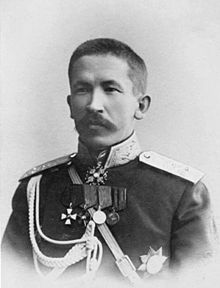
Back لافار كورنيلوف Arabic Lavr Kornilov Azerbaijani Лаўр Георгіевіч Карнілаў Byelorussian Лавър Корнилов Bulgarian লাভর কর্নিলভ Bengali/Bangla Lavr Kornílov Catalan Lavr Georgijevič Kornilov Czech Lavr Kornilov Danish Lawr Georgijewitsch Kornilow German Λαβρ Κορνίλοβ Greek
You can help expand this article with text translated from the corresponding article in Russian. (July 2024) Click [show] for important translation instructions.
|
Lavr Kornilov | |
|---|---|
 Kornilov in 1916 | |
| Born | 30 August 1870 Ust-Kamenogorsk, Semirechye Oblast, Russian Turkestan, Russian Empire |
| Died | 13 April 1918 (aged 47) near Yekaterinodar, Russian SFSR |
| Allegiance | |
| Service | |
| Years of service | 1892–1918 |
| Rank | General of the Infantry |
| Commands |
|
| Battles / wars | |
| Awards | |
| This article is part of a series on |
| Conservatism in Russia |
|---|
 |
Lavr Georgiyevich Kornilov (Russian: Лавр Гео́ргиевич Корни́лов, IPA: [ˈlavr ɡʲɪˈorɡʲɪjɪvʲɪtɕ kɐrˈnʲiləf]; 30 August [O.S. 18 August] 1870 – 13 April 1918) was a Russian military intelligence officer, explorer, and general in the Imperial Russian Army during World War I. He served as Supreme Commander of the Russian Army and as the military leader of the Whites in the Russian Civil War. He is particularly remembered for the Kornilov affair, an unsuccessful coup d’etat against the Provisional Government led by Alexander Kerensky. The event became a significant turning point in the Russian Revolution, strengthening the Bolsheviks' position and influence.[1][2]
Born in Ust-Kamenogorsk, Kornilov began his military career after graduating from the Mikhailovsky Artillery School and the General Staff Academy. He distinguished himself during the Russo-Japanese War and later served as a military attaché in Qing China. During World War I, Kornilov commanded the 48th Infantry Division and gained recognition for his daring escape from Austrian captivity in 1915. His successes on the Eastern Front elevated him to prominence, leading to his appointment as Supreme Commander during the revolutionary upheaval of 1917.
After the Bolshevik seizure of power in November 1917, Kornilov emerged as a key figure in the White movement. Following his escape from detention after the Kornilov Affair, he co-founded the Volunteer Army and led its forces in southern Russia during the early stages of the Russian Civil War. Kornilov was killed in 1918 during the siege of Yekaterinodar. His legacy remains deeply contested, viewed by some as a patriot fighting for Russia's unity and by others as a reactionary figure whose actions exacerbated the nation’s descent into chaos.[3][4]
- ^ Peeling, Siobhan (8 October 2014). "Kornilov, Lavr Georgievich, in: 1914-1918-online". doi:10.15463/ie1418.10115.
- ^ "Kornilov Affair". Soviethistory.org. Archived from the original on 2014-03-30. Retrieved 2014-04-30.
- ^ Rabinowitch, Alexander (2004). The Bolsheviks Come to Power: The Revolution of 1917 in Petrograd. pp. 166–170.
- ^ Figes, Orlando (1997). A People’s Tragedy: The Russian Revolution, 1891–1924. pp. 477–480.